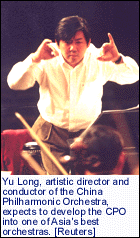|
 December
17 will be a night of musical firsts, as world-renowned pianist
Mikhail Pletnev arrives in Beijing to give a concert in co-operation
with the newly formed China Philharmonic Orchestra (CPO). December
17 will be a night of musical firsts, as world-renowned pianist
Mikhail Pletnev arrives in Beijing to give a concert in co-operation
with the newly formed China Philharmonic Orchestra (CPO).
Neither Pletnev nor the CPO have ever performed on a Beijing stage
before.
Critics and audiences regard Pletnev as one of the greatest pianists
of our time. He has been repeatedly recognized for his impeccable
musicianship, stylistic versatility and commanding technique.
Born in Archangel, Russia, Pletnev displayed exceptional musical
talent at an early age. Growing up in Kazan, he transferred to the
Central School of Music at the age of 13 and entered the Moscow
Conservatory in 1974, studying under Jakob Flier and Lev Vlasenko.
When he was 21, Pletnev earned early international recognition when
he won first prize at the 1978 Tchaikovsky International Piano Competition
in Moscow.
He performs frequently as soloist, and also as a recitalist with
some of the most celebrated orchestras and conductors, in many countries
and at major festivals in Europe and Asia, as well as in his native
Russia.
As a regular guest of London's Philharmonic Orchestra, Pletnev performed
with Slatkin and Ashkenazy in 1999 and received rave reviews for
his May 2000 performances of Tchaikovsky's complete works for piano
and orchestra under Vladimir Conta.
His recordings and live performances as a pianist have proved him
to be an outstanding interpreter of an extensive repertoire. His
unrivalled transcriptions for piano of Tchaikovsky's "Nutcracker
Suite" and "Sleeping Beauty" were selected, along
with his performance of Tchaikovsky's Second Piano Concerto and
the Seasons, for the 1998 anthology "Great Pianists of the
20th Century."
Attracted by Pletnev's reputation and his vision of a new model
for the performing arts in Russia, many of the finest musicians
in his home country joined him in launching the Russian National
Orchestra (RNO) in 1990.
Under his artistic leadership as music director and principal conductor,
the RNO has, in less than a decade, become known as one of the world's
leading orchestras.
For his Beijing appearance, Pletnev will join with CPO, a new ensemble
made up mostly of members from the former China Broadcast Symphony
Orchestra six months ago.
As one of the largest orchestras in the country, the China Broadcasting
Symphony Orchestra successfully presented numerous concerts of both
Chinese and foreign classics before it was restructured.
The transformation of the China Broadcast Symphony Orchestra into
the CPO has drawn attention in the country and won substantial support
from the State Administration of Radio, Film and Television.
By hiring top Chinese conductors and inviting the participation
of musicians from around the world, CPO could develop into a first-rate
orchestra, according to CPO's artistic director Yu Long.
In late November, the orchestra released two CDs in collaboration
with Deutsche Grammophon GmbH, a company that enjoys a reputation
as "the most famous brand of global classical recordings."
It is the first time in the company's century-long history that
it has helped record a Chinese symphony orchestra.
The programme of Pletnev's premiere concert consists of Richard
Wagner's Overture to Tannhauser, Tchaikovsky's Piano Concerto No
1 and Brahms' Piano Quartet in G minor.
In addition, CPO will present three pieces for orchestra from "Chinese
Airs" by Chinese composer Bao Yuankai, including "Passing
through the Great Wall," "The Flowing Stream," and
"Guess What the Flower Is."
Artistic Director Yu will conduct the CPO's first concert.
Xiong Shengmin, the CPO's managing director, believes the orchestra's
debut will prove the outfit is worthy of its name and capable of
living up to the expectations of music lovers and critics.
After its debut concert, the China Philharmonic Orchestra will start
rehearsal for its New Year concerts on December 31 and January 1,
2001, which will be broadcast by China Central Television.
(China Daily 12/11/2000)
|










